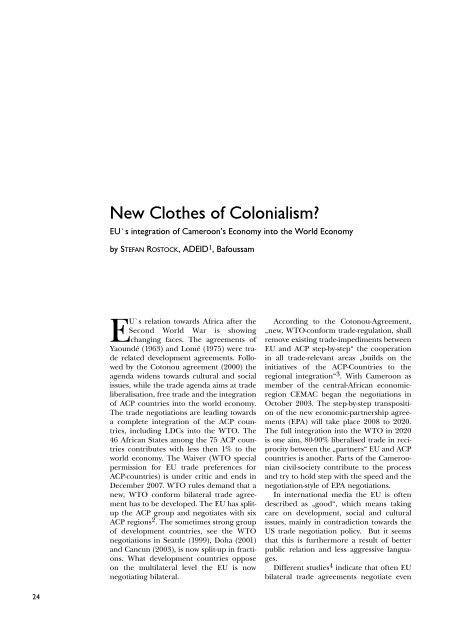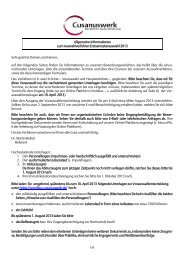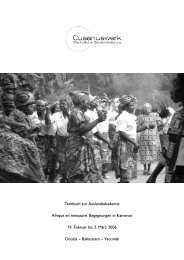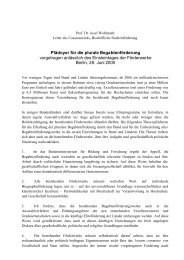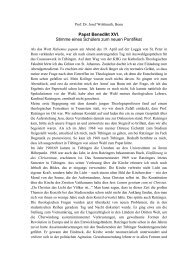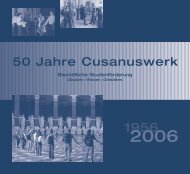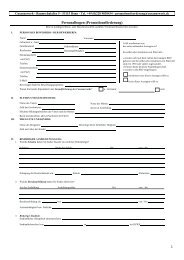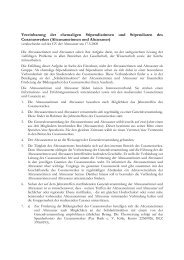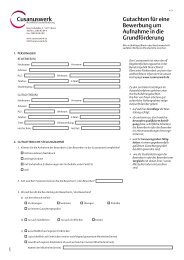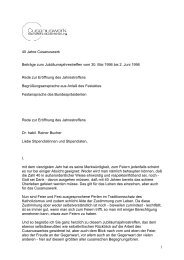Textbuch zur Auslandsakademie Afrique en ... - Cusanuswerk
Textbuch zur Auslandsakademie Afrique en ... - Cusanuswerk
Textbuch zur Auslandsakademie Afrique en ... - Cusanuswerk
Sie wollen auch ein ePaper? Erhöhen Sie die Reichweite Ihrer Titel.
YUMPU macht aus Druck-PDFs automatisch weboptimierte ePaper, die Google liebt.
24<br />
New Clothes of Colonialism?<br />
EU`s integration of Cameroon’s Economy into the World Economy<br />
by STEFAN ROSTOCK, ADEID 1, Bafoussam<br />
U`s relation towards Africa after the<br />
Second World War is showing<br />
changing faces. The agreem<strong>en</strong>ts of<br />
Yaoundé (1963) and Lomé (1975) were trade<br />
related developm<strong>en</strong>t agreem<strong>en</strong>ts. Followed<br />
by the Cotonou agreem<strong>en</strong>t (2000) the<br />
ag<strong>en</strong>da wid<strong>en</strong>s towards cultural and social<br />
issues, while the trade ag<strong>en</strong>da aims at trade<br />
liberalisation, free trade and the integration<br />
of ACP countries into the world economy.<br />
The trade negotiations are leading towards<br />
a complete integration of the ACP countries,<br />
including LDCs into the WTO. The<br />
46 African States among the 75 ACP countries<br />
contributes with less th<strong>en</strong> 1% to the<br />
world economy. The Waiver (WTO special<br />
permission for EU trade prefer<strong>en</strong>ces for<br />
ACP-countries) is under critic and <strong>en</strong>ds in<br />
December 2007. WTO rules demand that a<br />
new, WTO conform bilateral trade agreem<strong>en</strong>t<br />
has to be developed. The EU has splitup<br />
the ACP group and negotiates with six<br />
ACP regions 2 . The sometimes strong group<br />
of developm<strong>en</strong>t countries, see the WTO<br />
negotiations in Seattle (1999), Doha (2001)<br />
and Cancun (2003), is now split-up in fractions.<br />
What developm<strong>en</strong>t countries oppose<br />
on the multilateral level the EU is now<br />
negotiating bilateral.<br />
According to the Cotonou-Agreem<strong>en</strong>t,<br />
„new, WTO-conform trade-regulation, shall<br />
remove existing trade-impedim<strong>en</strong>ts betwe<strong>en</strong><br />
EU and ACP step-by-step“ the cooperation<br />
in all trade-relevant areas „builds on the<br />
initiatives of the ACP-Countries to the<br />
regional integration“ 3 . With Cameroon as<br />
member of the c<strong>en</strong>tral-African economicregion<br />
CEMAC began the negotiations in<br />
October 2003. The step-by-step transposition<br />
of the new economic-partnership agreem<strong>en</strong>ts<br />
(EPA) will take place 2008 to 2020.<br />
The full integration into the WTO in 2020<br />
is one aim, 80-90% liberalised trade in reciprocity<br />
betwe<strong>en</strong> the „partners“ EU and ACP<br />
countries is another. Parts of the Cameroonian<br />
civil-society contribute to the process<br />
and try to hold step with the speed and the<br />
negotiation-style of EPA negotiations.<br />
In international media the EU is oft<strong>en</strong><br />
described as „good“, which means taking<br />
care on developm<strong>en</strong>t, social and cultural<br />
issues, mainly in contradiction towards the<br />
US trade negotiation policy. But it seems<br />
that this is furthermore a result of better<br />
public relation and less aggressive languages.<br />
Differ<strong>en</strong>t studies 4 indicate that oft<strong>en</strong> EU<br />
bilateral trade agreem<strong>en</strong>ts negotiate ev<strong>en</strong>


